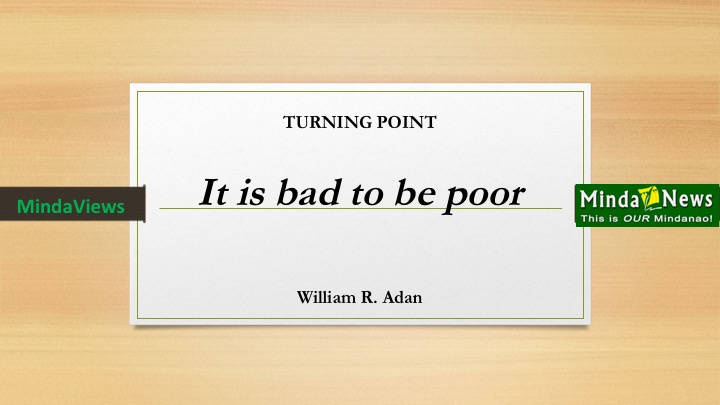
NAAWAN, Misamis Oriental (MindaNews/07 June) — Always, in natural and man-made calamities, the poor bear the brunt of the disaster.
In natural calamities, everywhere the poor who live in makeshift dwellings are often the ones easily blown away by crazy hurricanes, swept to hell by violent , rampaging flood waters and tsunamis, and flattened to the ground by treacherous earthquakes.
In man-made disasters like the one currently obtaining in the Marawi siege, the poor are the ones mostly trapped in the war zone, the first to starve, the last to be moved out from the shooting war, having no transport and means to leave the place on their own. Some would no longer dare leave the comfort or current discomfort of their homes knowing they have nowhere to go or money to spend in the place they would be moved to. They have opted to stay and take stock of the limited and grave certainty of their familiar surrounding rather than venture in the totally unknown and uncertain.
Indeed, the poor have very limited options in normal but most particularly in abnormal times.
The poor are the ones packed like sardines in often unsanitary evacuation centers, surviving on relief goods and at the mercy and goodness of kindhearted souls. At times, the help and assistance, however well-intended, may end up to adding to their difficult situation. Consider rice donations: the evacuees often do not have cooking utensils, much more water and fuel to cook them. Meanwhile, the sick among them, lacking medicines and medical attention, could do nothing but wait for God’s intervention to end their miseries.
The torment suffered by poor women in crowded evacuation centers has no equal. It is worse than the rest of the evacuees. They have no privacy to attend to their bodily needs. (I have observed in countless relief operations that relief goods do not usually include lady undies and napkins). You could just imagine the anxiety and discomfort of the unfortunate women in the situation they found themselves.
The well-off, although similarly harassed, traumatized and scarred by the incident were quick to leave the conflict area in their private vehicles. They don’t have to get out from their SUVs and expose themselves to the elements for the endless body or baggage inspection in military checkpoints, unlike those taking government evacuation transports or public vehicles. They don’t stop at evacuation centers but immediately seek comfort in hotels or in their second homes either in the nearby city of Iligan or Cagayan de Oro. While those not as able, seek refuge and accommodation in the homes of well-to-do relatives in the two cities. Their sick are immediately rushed to trustworthy hospitals and attended to.
Not so with the poor. If they have relatives in other places, they are also mostly poor like them and are not in a position to extend much needed help, however willing they may be, to ease their discomfort and suffering. Hence, they could not leave evacuation facilities at will to end their nightmares.
It’s really bad to be poor. (MindaViews is the opinion section of MindaNews. William R. Adan, Ph.D., is retired professor and former chancellor of Mindanao State University at Naawan, Misamis Oriental, Philippines.)







